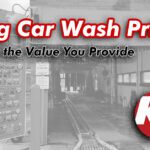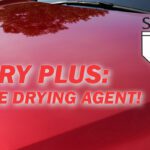Let’s begin with the good news. Car washes, whether you’re running a self-serve, tunnel, IBA, express, or other, are inherently more environmentally friendly than a person washing their vehicle in their own driveway.
Now, the bad news: they could be better. There are a number of ways you can step up reducing your car wash’s environmental impact. Many of these won’t just save the environment, but will also save you money in the long run! Let’s take a look at the advantages professional car washes have, and how you can gain even more of an edge!
Inherent Advantages of Professional Car Washes
This is a great selling point to any environmentally-conscious potential customers, or environmentally-minded organizations in the area if you’re looking to partner with them. A professional car wash has some inherent environmental advantages versus street, at-home, and parking lot washes done by the individual.
Water Usage and Reusage
The average home hose set-up pushes around 63 gallons (238.5 liters) in 5 minutes or less of water flow from a 5/8” garden hose at 50 pounds of water pressure, per the University of Idaho. Much of the washing process itself is done through a five-gallon bucket where water and soap are mixed. However, the pre-wash and the rinse process require water flow. Even with some of the excellent hose nozzles available for focusing or spreading the water spray, it can take up to ten minutes or more for a quality pre-soak and rinse. If you’ve got a van or large SUV, potentially even higher. That’s well upwards of 100 gallons per wash.
Compare this to the range of 15-44 gallons per vehicle on average noted in the ICA’s 2002 water use study. While you may think “well, that’s a 20-year-old study” remember that, well, it’s a 20-year-old study. Our industry has not taken steps backwards in water usage since then, only forwards, so those numbers are likely lower today.
High-pressure nozzles and low-horsepower pumps, along with cloth mittens and brushes, are a big reason for this. High-pressure water is better for rinsing than low, 50 PSI hose water. The concentrate spray means you actually need less water, but will rinse more more. Cloth mittens and brushes require less water to do their work than many at-home tools. So technology used in professional washes gives them a water-saving advantage.
Unlike doing it at home, that water isn’t always fresh water either – and that water doesn’t just run into the ground. The majority of car wash now feature fresh water only for the final rinse. By recapturing and reclaiming used water through collection and filtration, some IBA and tunnel washes can reduce the amount of fresh water needed per vehicle even further. The Western Car Wash Association estimates that it can be reduced to as low as 9-15 gallons per wash!
Run-Off Control
A study by the City of Federal Way (Washington) found that residential car washing dumps all sorts of chemicals into the surrounding ecosystem. The study found the following being released into their storm sewer system after surveyed car washes:
- 190 gallons (719 liters) of gasoline, diesel and motor oil
- 400 pounds of phosphorus and nitrogen
- 60 pounds of ammonia
- 2,200 pounds of surfactants
- 3,000 pounds of solids
And this is merely the total annual release for a community of 62,000 passenger cars and trucks! There’s more than 300 million registered passenger vehicles in North America – almost 5,000 times the amount as that single city. So multiply those numbers from the survey by 5,000… and that’s just annually. Now think about it year after year!
You may hate your sludge pits, but along with your reclaim tanks, they collect much of these chemicals in an environmentally safe way. Instead of them running off or leaching into the soil around the wash, you scoop out the sludge containing the chemicals. The chemicals don’t flow into the soil or into the storm drains surrounding your wash. They are removed from the area to a solid waste landfill, where the sludge is contained.
Solar Power
There have been criticisms of solar power in the past, many of which were valid. Early on, it was cumbersome and expensive to implement. Early solar technology was somewhat inefficient, had short life spans, and was even detrimental to the environment when disposed. They contained little in the way of reusable or recyclable components. Solar received limited local support, and was difficult to integrate in many areas. Storing excess production – literally for a rainy day – was expensive and rarely capable of storing enough for a business to run on if there were sequential rainy or cloudy days.
Solar has come a long way since the pushes of the early 21st century. Modern solar components are smaller yet more efficient, making them easy to mount or include in construction of a facility. They don’t take up quite as much space as they did in the past, and as time goes on, the initial investment to install these systems continues to fall.
It helps that many car washes and their lots are structured in a way that makes them conducive to solar power. There is plenty of unused roof space for panels. Tall trees aren’t welcome around washes. You don’t want leaves and needles dropping on a car as it emerges from a tunnel all nice and clean, do you? Definitely don’t want sap and pollen blowing onto a dried car being vacuumed! By having property that has space around the main building, sunlight can stream in unfettered. This allows for constant charging on sunny and even partly-cloudy days.
Southeastern Pennsylvania car wash chain Mr. Wizard Car Wash has four total locations with two locations featuring massive solar energy systems installed by Paradise Energy Solutions. They estimate that the systems will pay for themselves within six years, and that, along with tax benefits, it was an obvious choice over traditional power. And that’s in notoriously weather-fickle PA, where sunny days are up and down – imagine the savings in sun-happy Arizona, New Mexico, Florida, Colorado, and other southern states!
On top of being green for the environment, solar power can help put a little bit of green back in your wallet. As Gary Regester of Mr. Wizard notes, aside from savings on electric and tax rebates, that his property values have been assessed since, and increased by more than the cost of the solar installation. This isn’t just limited to Mr. Wizard – Classic Car Wash in Iowa, iShine Express in Austin, Valley Car Wash in Virginia, and plenty more have seen the benefits of moving to solar power.
Become a WaterSaver
The WaterSavers recognition program is run by the International Carwash Association. This program recognizes and certifies environmentally friendly car washes, and makes it clear to consumers who are hoping to patronize an eco-friendly business.
So what do you need to do to reach the point of being recognized?
- Route all water discharge to a water treatment facility or leech/septic field as permitted.
- Install a backflow prevention device that operates on the potable water supply.
- Inspect all spray nozzles to ensure maximum efficiency of water used.
- Maintain all water-saving devices to original or improved specifications for the conservation of water.
- Spot-free reverse osmosis concentrate (a.k.a. reject) is reused in the wash process (if system is installed).
- Meet all local effluent criteria, including the use, treatment and handling of car wash chemicals.
WaterSavers® members must also use an average of no more than 40 gallons (151.5 liters) of potable/fresh water per car in conveyor and in-bay/roll-over systems. Self-service washes must use 3 gallons (11.4 liters) of water per minute or less.
Even if you’re not ready to meet WaterSaver’s strict criteria, striving to get to that point is an excellent step. Making the incremental steps to get there should show savings along the way.
Better Car Washing Through Chemistry
We know that advances in chemistry have made car wash chemicals more efficient and better at a good clean. At the same time, they have become less volatile in their composition. Less volatile chemicals means less pollutants, and less harmful substances making their way into the local ecosystem.
Eco-friendly carwash chemicals have a number of desirable traits. They are noncorrosive, biodegradable, and nonflammable. This means they don’t require the extra cost and safety measures for transportation or disposal, and don’t present the potential problems for those who come in contact with them that older chemicals did. The majority of the soaps and chemicals we carry here at Kleen-Rite fit this ideal. Consider our recent changes to the Kleen-Wall product, highlighted here!
It’s not just doing a better job with run-off and pollutants that we’re seeing from better chemistry either. Looping back to an earlier point, improved chemistry has allowed for the reduction of water in the application process, relying instead on chemicals to do the work. In many cases the water is being used merely as a diluent. These environmentally friendly chemicals have gone a long way towards reducing the impact of car washes.
Other Environmentally-Friendly Opportunities
There are other opportunities to reduce the environmental impact of your carwash.
Offer Reusable Towels Instead of Paper Towels: Don’t add more paper to landfills, or throw away money! Offering disposable towels for drying may save a small amount of money, but you’re adding large amounts of waste to your landfill contributions. Instead, offer courtesy towels that can be laundered and reused!
Switching to LED Lighting: These low-voltage LED Lighting powerhouses are quickly becoming the industry standard for car wash lighting. With low-to-no UV emissions, reduced energy usage, long-lasting bulbs, and flexibility in design, these lighting unites are environmentally friendly while also being economic.
Keeping Spill Kits on Hand: All sorts of chemicals and oil products can be found at car washes. When they spill, they can contaminate the surrounding environment. Make sure to keep a spill kit on hand and tackle oil and chemical leaks immediately to prevent polluting the space around your environment. Your landscape will thank you!
Changing Behaviors: By improving the behaviors of yourself and your employees, you can make your car wash a greener place. Make recycling a priority. Install automatic on/off lighting so that areas aren’t lit when no one is in them. Reduce paper use by going to e-mail receipts, paperless billing, auto-renew memberships done via e-mail, and more! Reduce the use of plastics, and make sure the plastics you use can be recycled.
It’s pretty obvious – greener, environmentally-friendly, more eco-conscious car washing is the future. It might not be all at once, but the available green technology continues to improve, and eclipse conventional approaches. Customers are seeing the benefits of this, and will be a driving force pushing washes towards this as we move on. Get ahead of them! It might be the push you need to make your car wash more profitable and more of a presence in your community!














